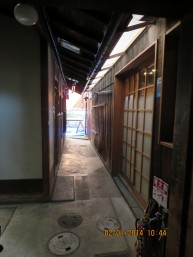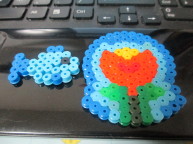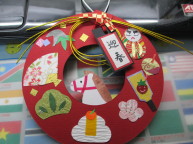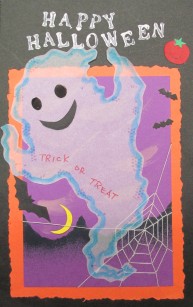私は春学期、CIPとして大原学院という小・中学校で英語を教えるボランティアをしています。毎週水曜日、日本語の授業が終わったらすぐ大原に行って、四時間ぐらい過ごしています。まず、二、三年生などの先生と生徒一緒に話しながら給食を食べています。ちっちゃい子供達は、すごく可愛くて、学校の中で一番内気ではなさそうだがら、この時間を楽しみにしています。そのあと、英語を教えていらっしゃる前田先生と打ち合わせをしてから、二つのクラスを教えることになっています。各学年が違う英語力を持っていて、しかも違う性格が見えるから、みんなと知り合うのは楽しいし、日本の学生生活を学ばせてもらういい機会でもあります。授業では、会話や発音の練習をしています。日本とアメリカの学校のあり方や教え方はかなり違っているから、毎週色々な面白いことに気づいて勉強になります。
「Volunteering」カテゴリーアーカイブ
スコーブル・エミリー:Kyoto Cooking Circle and KLEXON
今学期はCIPを二つ選んだ。「京都クッキングサークル」というサークルで料理を作り、「KLEXON」という英会話のサークルでボランティアをしている。私は料理を作ることが大好きなのだが、京都クッキングサークルでは、美味しい料理を学び、作った昼ご飯を食べながら、日本人や他の外国人と話せる。まず、先生が作り方を教えて下さり、四つのグループでその料理を作ってみた。先生達は日本語でおっしゃるが、日本人のメンバーは外国語を練習したく、外国人のメンバーは日本語を練習したいから、とてもいい環境だと思う。同じテーブルの人達とよく話せるが、昼ご飯を食べ終わった時に、皆は自己紹介をするから、色々な人に会うことが出来る。料理教室は一ヶ月に一回しかない、そんなに少ないのは残念だと思う。毎回違うメニューを作るから、とても楽しく、これまでに和食とフランスっぽい料理を作ってみた。これからも楽しみにしている。
「KLEXON」という英会話のサークルにも参加している。英語を練習したい日本人が来て、そこで外国人と練習し、友達になれる。私も友達になりたいから、KLEXONに決めた。練習は二時間で、一時間目は二人で話すことで、二時間目は5人から7人までのグループで一緒に話すことだ。話題はもう決まっているが、好きなことも話せる。もちろん、英語をよく使うが、日本語を練習する時間も多い。KLEXONは普通の練習の他にも楽しそうなパーティーや遠足がある。私はまだ行っていないが、ぜひ行ってみたい。
私の選んだCIPは面白く、たくさん人と話すことが出来るから、いつも行くのを楽しみにしている。
ウィリアムズ・ベイリー:Kyoto Hub
中村先生がKyoto Hubについて紹介してくださった時、気になった。アメリカ以外のコミュニティーを作る機会なので、面白いと思ったのだ。Kyoto Hubに入り、インターンになってから、様々なイベントに参加した。一番目のイベントでは、写真やビデオなどを撮ったり、修験道について習ったりした。修験道というのは、仏教と神道を合わせ、修行のために僧侶が山に行くという宗教だ。内容が難しかったので、えりさんという担当者が発表していた男の方の話を通訳してくださった。私は初めて日本語を同時通訳しているのを聞き、驚いた。私の夢はペラペラに通訳したり翻訳したりすることなのだ。だから、他の人が私の夢を達成しているのを見たら、感動した。
イベントに参加する他にもブログを英語に翻訳することもしている。やはり、翻訳することは難しいが、非常に楽しい。他のインターンと一緒に、もう一つ目のブログを翻訳したが、二つ目のブログは特に難しい。そのブログは自然についての比喩が多いのだ。しかし、難しくても、夢の実現だからうれしい。
カプル・ニーナ:Deepest Kyoto
京都は歴史的な町で、色々な大切な寺や神社や博物館があるが、京都に住んでいる人と京都に旅行する人は人気がある歴史的な場所だけ行く。でも、清水寺や金閣寺や伏見稲荷などだけではなく、京都では色々な他の面白くて豊な歴史がある場所もある。だから、「ディーペスト京都」というツアーの組織の目的はその観光名所ではない場所を探って、観光や日本人を案内してあげることだ。
私は山口吾往子さんというディーペスト京都の理事と三人の他のインターンとボランティアした。私達は無料でツアーに参加して、ブログのために、写真を取ったり、ノートを書いたりした。2月一日に「京都の町家」ツアーがあって、私達は古くて豊な歴史がある町家に行って、色々な面白い建築や町家の歴史について教えてもらった。そのツアーは経験的なツアーで、皆は昔の日本の技術を使ったり、色々な町家がみられながら歩いたり、町家の台所で料理した食べ物をたべたり出来た。
毎週水曜日、ツアーの企画や前のツアーの反省について会議があって、皆は他のツアーのアイディアを出し合ったり、前のツアーの改善点についてはなしたり、京都にある面白いイベントを探したりした。また、私達は会議の外にたくさんほかの準備や宿題がある:ブログや写真を取る事やFBで短い記事を書く事などしなければならなくて、忙しかった。だから、とてもいい経験で、色々な面白い分からない京都の歴史について学ぶことができた。
ワイスガント・カミー:京都芸術センター
私の専門は舞台芸術と日本語だから、KCJSで勉強している間、舞台芸術のことにも参加したかったです。それから、京都芸術センターでCIPをすることに決めました。芸術センターは四条烏丸の近くの古い小学校の校舎にあります。京都芸術センターは京都の若いアーティストが支え合うことにこだわりがあります。そのために、制作室利用者というプログラムがあります。そこで京都の市民はアーティストに会えるし、演奏や展示会や茶道などを見られるし、ワークショップにも参加できます。センターに図書館と喫茶店があります。スタジオもあって、そのスタジオを借りられます。
京都芸術センターで私はウェブサイトのために英語の翻訳のものを編集したり、イベントがある時手伝ったりします。先週末、Dance4Allというイベントでボランティアしました。そのイベントはダンスの中の包括性を推進するものでした。イベントのメッセージは「誰もが踊ることができる」でした。一日中ワークショップと講演と演奏がありました。私はお客さんに挨拶して、プログラムを配りましたので、様々な人に会えました。他のボランティアとも話しました。そして、ダンスの演奏を見ました。一つの演奏は一番感動したダンスで、お年寄りと子供と障害者と一緒に踊りました。その後でボリウッドというインドのダンスも見ました。このイベントは、様々は舞台芸術ができることを示しました。本当に面白かったので、次のイベントにぜひみんな来てください。
ダイジェン・ジェン:HUB Kyoto
ボストンにいた時、「Impact Hub」という場所のことを聞いたことがある。そこに行ってみたくても、時間がなかったので、いつも行けなかった。一月にKCJSに来て、「Impact Hub Kyoto」 のインターシップの機会を聞いたので、ぜひ行くことにした。
「Impact Hub Kyoto」というのは、社会や世界を変革したい人たちが集まり、いろいろなイベントを催し、新しい行動を起こす場所だ。社会や世界を変えるために、まず自分が変わらなければいけない。
最初の日に、Hubのスタッフがオリエンテーションをしてくれ、三ヶ月間ぐらいイベントのブログを英語に翻訳することと、イベントに参加し、感想を書くことに決めた。イベントの話はわかりにくかったが、スタッフがよく通訳してくれたのでよかった。イベントに行った時は写真やビデオも撮ることになっている。
Hubは新しい思想を交流するところだし、日本人のスタッフと日本語を練習するいい場所だから、そこでインターシップをしていることは素晴らしい経験だと思う。
エスカミヤ・イバン : Hub 京都
一月に日本に来てからHub京都というコミュニティセンターにを見つけました。Hub京都では色々なイベントがあるから、この経験を通して同志社の同級生だけではなくて、京都府から集まる人々にも会える可能性があります。Dojo for Changeをはじめ、Hub Kitchenや Bar Hubなどと言うエベントでコミュニティを手伝う人がよく参加したり、論議したり、お金を拠出したりします。Hubの一般的な目的は人々の間に親しみを浸透させることです。
2月12日にHubのブログのためにDojo for Changeに行って、そういうイベントの内容を要約しました。「美しさに真実があります。でも、混乱の中で美しさがあります。」と語ってくださったのは、「創造性の求心力」と言う特別なDojo for Changeで発表して下さった黒崎輝男でした。この世界でお金が必ず要るけど一番大切なのは自分の夢のだとか。黒崎さんは多くの抽象的な言葉を使ったので最初に分かりにくかったですけれども、えりさんというHubの幹事のおかげで翻訳してくれたから深く理解できてよかったです。
Hubで他の義務はエクセルの中にえりさんがもらった名刺の内容を入ることや、イベントの部屋のレイアウトの図を書くことが含まれています。たいてい忙しいですがこれまでHubを楽しんできました。
ミンテン・オーヤン:KLEXON
昨年9月に初めて日本に来てから、長い間緊張と不安を感じていました。お馴染みの友達や文化や社会のルールなどから離れて、新しい環境で留学していると、問題がもちろん様々あります。言語はその中の一つです。どこに行っても、「この場合、何を言ったら適切だろう」という問題に悩んでいましたが、不安感の根源は、外国人としての私が、新しい国への帰属感に欠くことでしょう。その帰属感を得るため、私は日本人の友達を作るために、「KLEXON」という英会話サークルに参加しました。
「KLEXON」は英語を練習したい学生と社会人向けに創立された京都のサークルです。活動の場所は地下鉄四条駅の付近にある「WINGS KYOTO」というビルの二階で、今出川キャンパスからそこまで二十分しかかからないから、とても便利です。一週間に一回例会(レギュラーミーティング)があって、時々いろいろなイベントもあります。毎週の例会は二時間で、一時間目はマンツーマンで面接のように話します。二時間目はグループになって、一つのトピックについて会話を交わします。
最初KLEXONに参加する時、多少緊張していました。でもみんなは優しかったし、リーダーさんも親切だし、みんなと話していたミーティングの間にその緊張感がどんどんなくなっていきました。二時間ずっと英語と日本語をちゃんぽんで話すのは疲れますが、本当に面白かったです。そして初めて参加したのに、意外に友達がたくさんできました。
今月は私が参加してから五ヶ月目です。KLEXONのおかげで、日本人の友人をたくさん作れて、私の京都の生活がカラフルになりました。
ブリアナ・フリーマン:英語アシスタントと英会話サークル
私はCIPが二つあります。中学校で英語のアシスタントをすることと英会話サークルです。
アシスタントのCIPで、先生が授業で関西弁をお使いになることにびっくりしました。でも、どうやって学生が標準語を学んだかと考えて、多分先生は授業で関西弁も標準語もお使いになっているだろうと思いました。私にとって標準語はめずらしくないので、関西弁にしか気がつかなかったのかもしれません。
前は、中学校で教えるのはこわそうでした。二回目は一回目と同じの中学2年生だったので、その後ちょっとなれてきて、楽しくなってきました。でも、三回目は中学校2年生で、全然違いました。初めてからアメリカの中学校と日本の中学校の罰則が違うということが見られました。日本の中学校の方が学級崩壊がひどいと思います。(もっとも私は日本の中学校とアメリカの中学校を一つずつしか知りませんが。。。)
まだ中学生1年生なので、一回目と二回目の2年生より学級崩壊があったことは当たり前と言えます。それでも、すごくビックリさせられました。中学校で教えてはじめて中学校の先生に絶対になりたくないことに気がつきました。(JETプログラムを考えているのですが、高校生の方が教えやすいにちがいないと思います。)できるものなら、中学校の先生の給料を上げて欲しいです。それにあたいします。
英会話サークルでもやっぱり英語だけで話します。ちょっとガッカリしました。それに、相手と話す時間は10分しかありません。よく相手とおもろい会話をしている最中に、「はい、次!」と言われてしまいます。それにもかかわらず、面白い会話ができていいですけどね。楽しくなってきています。
よく相手が社会人だと気がつきました。もっとアメリカ人の大人も外国語を勉強したらいいなと思います。英会話で頑張っている日本人と話すたびに、自分の心に闘魂が燃えてきます!
ロマーナ・ペレズ:にこにこトマトボランティア
今学期も「にこにこトマト」というグループでボランティアをしています。「にこにこトマト」のみなさんと京都大学の病院で入院している子供たちと遊びます。
私いろいろなことを手伝っています。たとえば、最近私たちは子供たちとさまざまな作品を作っています(写真一)。それに、子供たちのために、ていねいに行事のカードを作ってあげます(写真二と三)。「にこにこトマト」でしていることは本当に楽しくて、いいことだと思います。子供たちのために、イベントをしたり、資金集めをしたりするのはいいことだから、アメリカに帰っても、そのようなことを続けることにしました。
子供達だけではなく、私もこの生活をすることを通じて、幸せになります。
写真一
写真二と三




